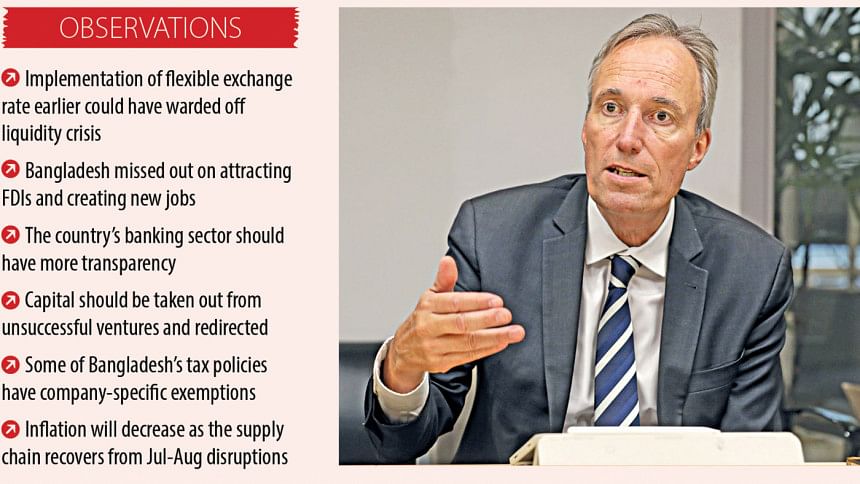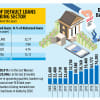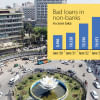Banks mostly gave loans to their owners rather than creditworthy borrowers

Bangladesh's banking sector was not well-managed in recent years. Banks mostly gave loans to their owners, rather than to creditworthy entities. Consequently, several banks are now in difficulty.
Besides, the previous administration could not effectively manage the exchange rate. It acted opposite to conventional economic wisdom.
They opted to defend a fixed exchange rate, even though the Reserve Bank of India (RBI) allowed the Indian rupee to depreciate to ensure that its competitiveness was not negatively affected.
"This caused losses of a lot of reserves. As a result, liquidity was getting tighter," said Martin Raiser, the World Bank (WB) vice president for South Asia region.
"If Bangladesh had instituted this kind of policy five-six years ago, it would not have faced the kind of liquidity shortages that the economy experienced."
In an interview with The Daily Star at the end of last week in Dhaka, he said the Bangladesh Bank is currently addressing these issues.
"I think they are doing a good job, but clearly, the financial sector needs to be one of the focuses of reform efforts now to create stronger banks and ultimately to provide more credit to SMEs [small and medium-sized enterprises]," he said.
Raiser, who visited Dhaka in the second half of the last month, also spoke about Bangladesh's economic performance, the reasons for persistent inflation, implications of low revenue collection, and necessary reforms to salvage the ailing banking sector.
The WB official also responded to questions regarding the overall support that the Washington-based agency is considering in response to a request from the interim government, which was sworn in after a mass uprising ousted the Sheikh Hasina-led government on August 5.
People here are ready to invest, to be busy and to try and improve their livelihoods. This could have led to more growth if they had access to credit.
Raiser said Bangladesh has indeed done very well, not just recently. Its transformation has been remarkable since independence.
"We have always regarded Bangladesh as a success story."
He said in recent years, the Covid-19 crisis has adversely affected all countries and also had an impact on Bangladesh.
The country could not recover fully due to the slowdown in global trade.
Raiser said Bangladesh is getting more developed, so remaining specialised solely in readymade garments is not so sustainable. Because there are limits to the productivity increases that one can get from a single sector.
"Bangladesh has missed the opportunity to diversify the economy, bring in more foreign investment, bring more technologies, and create different kinds of jobs since the global financial crisis."
NEED A LEVEL PLAYING FIELD
Raiser said he visited Bangladesh five to six times and saw the strength of entrepreneurship.
"Lots of people are ready to invest themselves, to be busy and to try and improve their livelihoods, from the rickshaw drivers to, you know, small manufacturing to fashion designers to the gig economy. Now, a lot of dynamism could lead to more growth and more jobs if they had access to credit."
However, the nation is not getting all the benefits in the absence of a level playing field.
"So, those are some areas where Bangladesh didn't do very well in recent years and could have done much better.
"But there, you know that they can benefit. The last administration invested a lot in infrastructure and that got better. Connectivity is better, so there are some positive foundations on which Bangladesh can and should build."
OVERALL FUNDING ENVELOPE TO BE ROUGHLY $3.5 BILLION
Raiser said the interim government requested budget support for the energy sector and banking reforms.
The envelope of fresh money would be about $2.2 billion, including over $1 billion in repurposed loans, overall funding would be roughly $3.5 billion.
The official said the WB and the government have been in discussions on what will be done to support banking, tax reform, better governance, and transparency, to support the energy sector and social assistance.
"Some of these discussions predate the recent changes. Some of them are new."
BANKING SECTOR NEEDS TRANSPARENCY
Raiser said the multilateral lender wants to get more transparency in the banking sector.
He said people who park deposits in banks should know who the beneficiary owners of the banks are. When supervisors provide credit, they should know who the beneficiary owners of the enterprises are and to whom the money is lent.
"I mean, there are standards in the banking industry that impose strict limits on self-dealing. If you own a bank, you can't use that bank to benefit enterprises that you also own.
"Now, if you want to enforce those regulations, you need to know who owns what. The second is how you classify whether an asset is well-performing or not," Raiser said.
The WB Vice President said an asset becomes classified if a client cannot repay on time.
"And once the loan is classified, the bank has to keep provisions. They have to put capital aside," he said.
"That's expensive to the bank. Therefore, banks don't like to do that, but you have to force them, because if they don't have enough capital, at some point, depositors may not be able to get their money back."
He said Bangladesh has to have a better loan classification system.
Besides, measures should be taken to ensure that depositors are properly protected and to hold accountable shareholders who drive a bank in the wrong direction.
"These are the core elements of a modern and well-functioning banking system."
He said there should be better rules regarding insolvency legislation and management of distressed assets.
The purpose of all of this is to make sure that when some companies get into difficulties, the key for the policymakers is to ensure that resources are not locked up in companies that aren't producing any value, he added.
"So, you want to protect the people, but you don't want to protect every single venture. If it didn't work, take the capital resources, take the credit out and put it somewhere else where it has a better chance of success."
"That process of restructuring, of creating more competition, is complementary to the banking reforms. And it is something that we'd like to support, but that will take a bit more time," Raiser added.
On reforms, he said the interim government has to prioritise and respond to the expectations of the people.
"One of the things that I've heard very loudly is more accountability, more transparency, and better governance. That's something that I think they want to do, and they should do, because that's what the people are expecting."
He said the interim government obviously wants to make adjustments to the political and judicial systems and the rule of law and order, which is not the area of the WB's competence.
"Our area of expertise is the management of the economy," he added.
COLLECTING MORE REVENUE IS A KEY PRIORITY
Raiser said the WB can support improving economic management. Revenue management is an area Bangladesh should work on.
He said the revenue authority collects a fairly low level of taxes. As a result, it has limited public resources available to deliver better services.
"So, if you're talking about cleaning up the rivers, yes, that's a hugely important thing. But it's also expensive, so you're going to have to collect more revenue if you're going to do all of that."
The government also needs to spend more on education and healthcare.
"I think collecting more revenue is an important priority, and I think we can help both on the tax administration side and on the tax policy side," he said.
"Just to give you one example, Bangladesh has a lot of exemptions. Some of the exemptions are targeted to individual companies. That's not a very good tax policy."
Raiser also stressed the importance of better public finance management and procurement processes.
"What's the system whereby projects get approved? What's the scrutiny behind them, but then also, how efficient is the process?
"You don't want a lengthy approval process, but you want to make sure they're robust. There are proper checks and balances in place. That's another area that we can work on."
In the medium term, he said improving the business environment, making it easier for companies to get the permissions to invest and access to land is vital.
Raiser said the government needs to improve environmental regulations and ensure enforcement.
"It doesn't pay in the long run for a country to try and be competitive by polluting its own environment. Ultimately, people will pay."
INFLATION TO COME DOWN
The WB official, while responding to a question about why inflation in Bangladesh remained stubbornly high when neighbouring India managed to bring it down, said there had been major supply disruptions in July and August, which kept inflation higher.
Besides, he said until recently, monetary policy was also relatively loose.
"You know, real interest rates were negative, and all these factors combined probably led to a situation in which supply was restricted and demand was still supported and that has led to inflation."
Raiser said inflation rates have actually come down quite sharply in recent months.
"So, I think there's a good prospect with, you know, the new management and the Bangladesh Bank as they are committed to bringing inflation down. There's a good prospect that inflation will come down."
"It may not happen immediately. It takes a while for this to work through the system. But I think there are good prospects for inflation to reduce."


 For all latest news, follow The Daily Star's Google News channel.
For all latest news, follow The Daily Star's Google News channel. 





Comments